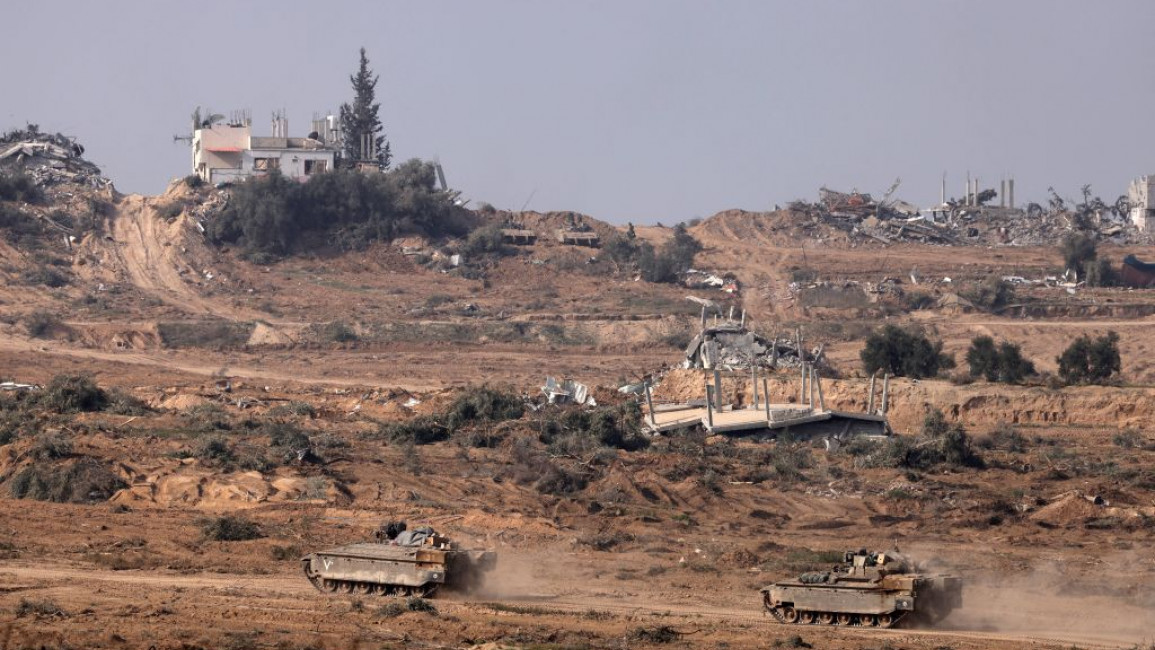What is Israel's planned 'third phase' of war in Gaza?
Israel's war on Gaza has been ongoing for 102 days, most of which had been marked by high-intensity conflict in the enclave, killing at least 24,285 Palestinians and wounding more than 61,154, according to Gaza's health authorities.
At the outset of the war Israeli defence minister Yoav Gallant set out Israel's military plans as consisting of three phases.
The first phase occurred before Israel began its ground operation, and consisted of a mass of air and artillery strikes, much of which was concentrated on northern Gaza.
Included in this phase was Israel's calling up of 300,000 reserves, amassing its army on the Gaza border, and demanding the evacuation of 1.2 million Gazans from the north to the southern part of the Strip.
Phase two began on 27 October with Israel launching its ground operations in Gaza, cutting the enclave in two, with deadly air strikes killing scores of Palestinian civilians, and medical facilities having to be abandoned after running out of operational supplies like fuel.
In December Isreael's state-owned broadcaster, Kan, stated that the military was preparing to enter the third phase. However, Israel has since expanded its ground offensive into Khan Younis in southern Gaza, and the Bureij refugee camp in central Gaza.
What is phase three?
According to the Israeli military phase three will consist of several changes from phase two's operations.
This includes the end of major combat operations and military manoeuvring like the operation to surround and capture Gaza City and its neighbouring areas.
Likewise, Israel also intends to release reservists mobilised for the ground manoeuvres in Gaza and reduce the number of troops present in the enclave.
As part of this downgraded troop presence, the military intends to shift its operations to targeted raids and special operations missions aimed at eliminating remaining Hamas fighters and dismantling its infrastructure such as its tunnel network.
A buffer zone between Israel and Gaza is also to be established inside the enclave.
Has phase three begun?
Phase three has been touted as set to begin in January, with the US having set a goal for Israel to end its high-intensity combat operations by the end of January.
Israel has also withdrawn five combat brigades from the enclave, and on Monday withdrew its 36th division for rest, refit and training purposes, leaving three divisions for combat operations.
Gallant also announced on Monday that intensive operations in Gaza's north had ended, indicating that those operations would also soon be over in the south.
"In the northern part of the Strip, this phase has ended. In southern Gaza, we will reach this achievement and [the intensive phase] will end soon" he said, adding that "in both places, the moment will come when we will move to the next phase".
However, combat operations in Khan Younis in the south and areas of central Gaza, have seen stiff resistance from Hamas fighters.
Israel has so far failed to eliminate its top target, Yahaya Sinwar, who heads Hamas' armed wing the Izz ad-Din al-Qassam brigades.
The Wall Street Journal reported that Israel was mulling over an operation to seize Gaza's southern city of Rafah, the only open border crossing allowing aid to enter the enclave, which is on the brink of famine.
Such an operation will involve high-intensity military manoeuvres that characterised the second phase of Israel's plan.
The third phase is likely to be implemented in different parts of the Strip at different times, and will be longer than the first two, with one official telling Reuters "This will take six months at least, and involve intense mopping-up missions".
It is not yet known what Israel plans following the end of military operations in the enclave, with Netanyahu reportedly refusing to set out a plan over internal cabinet issues.
Ultimately, Israel's military operations have been characterised by accusations of war crimes, with an ICJ case currently underway over alleged breaches of the genocide convention.



